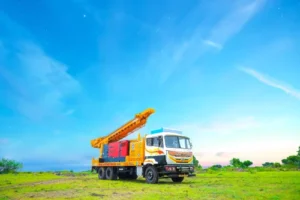Drilling Deeper: The Unregulated Borewell Trade in Gachibowli and Its Penalties
Gachibowli, a humming IT and trade hub in Hyderabad, has witnessed fast urbanization over the last decade. Skyscrapers, tech parks, and comfort flats now dominate its skyline, however this enlargement has come at a value: an insatiable call for for groundwater. The unregulated borewell business, thriving within the absence of strict enforcement, has turn into each a lifeline and an environmental danger for the area. This text explores the unchecked drilling practices in Gachibowli, their ecological and societal affects, and the pressing want for sustainable answers.
The Upward push of the Borewell Trade
Hyderabad’s groundwater ranges have plummeted as its inhabitants ballooned from 7.7 million in 2011 to over 10 million lately. In Gachibowli, the IT hall’s exponential enlargement has intensified drive on water sources. Borewells—vertical wells drilled deep into the earth to extract groundwater—have proliferated as a snappy repair for water shortage. Native contractors, steadily working with out allows, drill loads of borewells every year for residential complexes, places of work, and lodges.
The Telangana Water, Land, and Timber Act (WALTA) mandates allows for drilling past 20 meters, however enforcement is lax. Corrupt officers, prime call for, and obscure tracking techniques permit unlicensed drillers to function with impunity. A 2020 file through the Central Flooring Water Board (CGWB) discovered that over 60% of borewells in Hyderabad’s peri-urban spaces like Gachibowli have been unregistered.
Environmental Penalties
-
Depleting Groundwater
Gachibowli lies within the Deccan Plateau’s exhausting rock terrain, the place groundwater recharge is sluggish. Unregulated drilling has brought about water tables to drop through 3–4 meters every year, in line with CGWB estimates. Older borewells, drilled to depths of 300–500 ft a decade in the past, now require drilling past 1,000 ft to strike water. -
Ecological Harm
Over the top extraction dries up lakes and standard wells, disrupting native ecosystems. The disappearance of pollinators and local crops has been reported in spaces with dense borewell clusters. Improperly sealed borewells additionally act as conduits for floor pollution, contaminating aquifers with sewage and commercial waste. -
Greater Seismic Dangers
Geologists warn that over-extraction might exacerbate land subsidence and micro-earthquakes, even though this stays understudied within the area.
Socioeconomic Affects
-
Water Inequality
Whilst prosperous flats and places of work depend on deepbore wells, low-income communities face acute shortages. Water tankers, charging exorbitant charges (₹800–1,500 in keeping with load), pressure family budgets. -
Agricultural Decline
Farmers in neighboring villages file failing borewells, forcing many to desert agriculture. A 2022 find out about through the Indian Faculty of Trade highlighted a 30% decline in crop yields inside a 20-km radius of Gachibowli. -
Felony Disputes
Festival over groundwater has sparked conflicts. In 2023, citizens of Gandipet lodged a police criticism in opposition to a industrial complicated for “stealing” water thru unauthorized drilling.
Case Learn about: The Disaster in Nanakramguda
Nanakramguda, a residential house close to Gachibowli, epitomizes the disaster. Over 200 borewells have been drilled right here between 2020 and 2023, part of which dried up inside a yr. Households now spend ₹5,000 per thirty days on water tankers, whilst sinkholes and cracked constructions trace at subterranean instability. Native protests have yielded little motion from government.
Pathways to Sustainability
-
Imposing WALTA
Strengthening oversight by way of virtual allow monitoring and consequences for unlawful drilling may curb exploitation. -
Rainwater Harvesting (RWH)
Telangana’s RWH mandate for constructions is poorly carried out. Incentivizing RWH thru subsidies and consciousness campaigns can scale back groundwater reliance. -
Recharge Infrastructure
Developing recharge shafts and restoring lakes like Durgam Cheruvu would reinforce aquifer replenishment. -
Neighborhood Engagement
Participatory groundwater control systems, like Andhra Pradesh’s Jalamitra, can empower communities to watch utilization.
Conclusion
Gachibowli’s borewell disaster underscores the ambiguity of city construction: enlargement with out sustainability dangers collective survival. Balancing financial ambitions with ecological stewardship calls for stringent insurance policies, cutting edge water control, and public duty. The time to behave is now—earlier than the wells run dry.
FAQs: The Borewell Disaster in Gachibowli
1. What’s a borewell?
A borewell is a slim, deep neatly drilled into the bottom to get admission to groundwater, usually used for irrigation and home provide.
2. Why are borewells so prevalent in Gachibowli?
Speedy urbanization and insufficient municipal water infrastructure have pushed reliance on borewells to fulfill the calls for of IT parks, lodges, and home complexes.
3. Is borewell drilling criminal in Telangana?
Drilling calls for a allow underneath the WALTA Act. Then again, deficient enforcement has resulted in fashionable unregulated drilling.
4. How does over-drilling have an effect on groundwater?
Over-extraction depletes aquifers quicker than they are able to recharge, inflicting long-term shortage and ecological harm.
5. What are the well being dangers of infected groundwater?
Pollution from unsealed borewells may cause waterborne sicknesses like cholera and dysentery.
6. Can rainwater harvesting lend a hand?
Sure. RWH captures monsoon rains to recharge groundwater, lowering dependency on borewells.
7. What consequences exist for unlawful drilling?
Fines as much as ₹5,000 and imprisonment as much as 3 months are stipulated underneath WALTA, however enforcement is unusual.
8. Are there choices to borewells?
Municipal provide augmentation, handled wastewater reuse, and decentralized RWH techniques are sustainable choices.
9. How can citizens file unlawful drilling?
Lawsuits will also be filed with the Telangana Groundwater Division or native municipal places of work.
10. What’s the govt doing to deal with this?
Projects like Project Bhagiratha intention to enhance piped water provide, however implementation in city spaces stays sluggish.
By means of addressing those FAQs and advocating for systemic reforms, stakeholders can collaborate to safe Gachibowli’s water long term.



